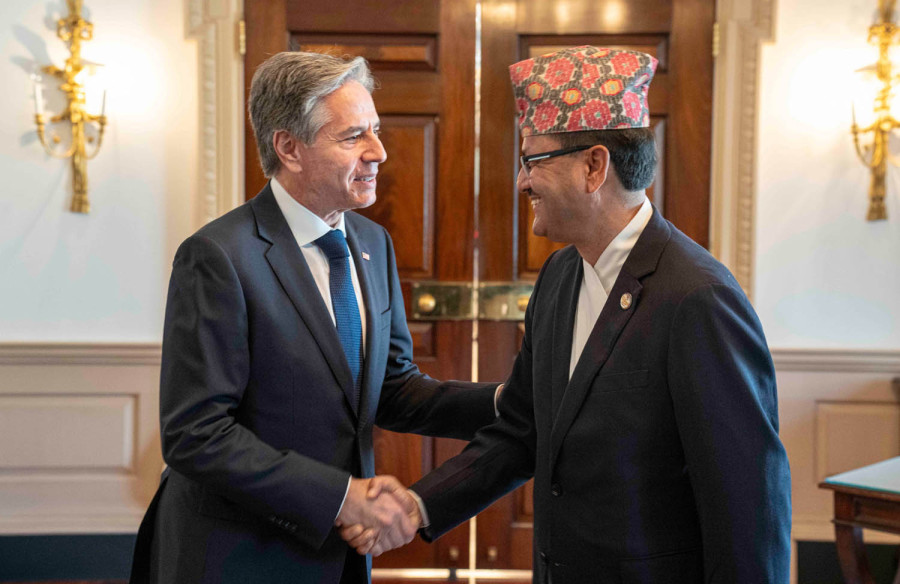National
Blinken: Nepal, US valued partners in Indo-Pacific region
Foreign Minister NP Saud urges renewal and expansion of trade preferences with the United States.
Anil Giri
US Secretary of State Anthony Blinken has said that Nepal and the US are valued partners in the Indo-Pacific region.
Ahead of his meeting with Foreign Minister NP Saud at the State Department in Washington on Monday, Blinken said, “We have 76 years of diplomatic relations between Nepal and the United States, and Nepal is today a very valued partner in the Indo-Pacific.”
“We are working together to ensure that we have a free, open, secure, prosperous region, and in so many ways, Nepal is leading, not just in the region but globally, as a very constructive actor in international organisations—of course, with so many peacekeepers who are trying to help people move from conflict to peace around the world.”
During the then Foreign Minister Pradeep Gyawali’s similar visit to Washington in December 2020, he had held talks with his US counterpart Mike Pompeo. Following their meeting the State Department had issued a statement highlighting Nepal’s “central role” in a free, open and prosperous Indo-Pacific, among other things.
The statement issued by the State Department’s spokesperson in 2018 had courted controversy in Kathmandu as the then KP Oli government was struggling to endorse the Millennium Challenge Corporation Compact from parliament. The $500 million compact was the largest grant received from the US, but courted controversy due to its possible links with larger US strategic interests including the disputed Indo-Pacific strategy (IPS).
While ratifying the US grant from Parliament in February 2022, lawmakers also added a 12-point interpretative declaration, which categorically stated that Nepal will not be a part of any security, military or strategic alliance.
On returning from Washington, Gyawali refuted the State Department’s statement and claimed that US officials had merely shared their Indo-Pacific vision and discussed Nepal’s potential central role in it. “We conveyed and communicated to them that Nepal does not believe in any strategic alliances and will not enter into such activities,” Gyawali had clarified.
Besides clarifications from both Nepali and US sides, a section of Nepali society continued to harbour suspicions that Kathmandu had already become part of the IPS, suggesting that this was the reason for Nepal’s acceptance of the MCC grant.
Foreign Minister Saud left Kathmandu for the US on Sunday on an official visit. Such a visit at the foreign minister’s level is taking place after nearly five years.
During the meeting with Blinken, Minister Saud was accompanied by the Nepali Ambassador to the US Sridhar Khatri and other senior officials from the ministry and the embassy. With Blinken was US Ambassador to Nepal Dean Thompson and senior officials from the Department of State.
Matthew Miller, spokesman of the State Department, said that at the meeting both Saud and Blinken emphasised the strength of the US-Nepal partnership and highlighted the role of MCC compact in Nepal’s infrastructure development and cross-border power trade.
The Secretary and Foreign Minister also praised over 60 years of partnership on Peace Corps Volunteers’ service in Nepal, reads the State Department statement issued after Monday’s meeting.
In addition, they discussed expanding US International Development Finance Corporation’s investment in Nepal, including providing a new $125 million loan to a Nepali bank to offer loans to small- and medium-sized enterprises, according to Miller.
Secretary Blinken also expressed the United States’ condolences over the deaths of 10 Nepali students in the October 7 Hamas attack on Israel, and concern for Bipin Joshi, who remains missing.
A statement issued by the Nepali embassy in Washington said that during the meeting, both sides expressed satisfaction with the current state of bilateral relations and reaffirmed their commitment to expand and deepen engagements in areas of mutual interests.
The foreign minister highlighted development priorities of Nepal in the context of the country’s graduation from the least developed country and called for enhanced support from the United States in the areas of trade and investment, market access, food security and IT sector, among others, said the statement.
He requested the United States for reauthorization and expansion of Nepal Trade Preference Program (NTPP) and GSP facilities by adding new exportable items of interest for Nepal, according to the statement.
Both sides stressed the importance of timely implementation of the projects under the MCC, the statement said.
Appreciating Nepal’s progress in consolidating democratic governance, Secretary Blinken said that the US government wishes to see Nepal as a strong and prosperous democracy, according to the Nepali Embassy.
Secretary Blinken assured Foreign Minister Saud that the US would continue its support for Nepal’s development endeavours, reads the statement, adding, “the two sides also exchanged views on Nepal-US cooperation in multilateral forums, and other matters of common concern in regional and global affairs, including the ongoing situation in the Middle-East.”
Before the meeting, Blinken said the US and Nepal are working to deepen their relations, particularly with more people-to-people ties, as well as economic ties and investment, according to the statement issued by the State Department.
“And in so many ways, Nepal is leading, not just in the region but globally, as a very constructive actor in international organisations—of course, with so many peacekeepers who are trying to help people move from conflict to peace around the world,” the statement quoted Blinken as saying.
In response, Saud thanked Blinken for taking the time to meet, despite the challenging situation in the Middle East.
Minister Saud is also scheduled to meet senior officials from the MCC, USAID, the Nepali community in Washington, and experts in the field of information technology, among others.




 10.12°C Kathmandu
10.12°C Kathmandu














